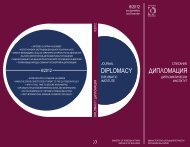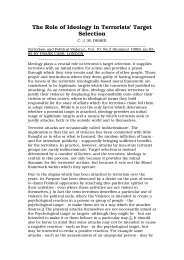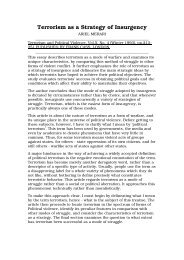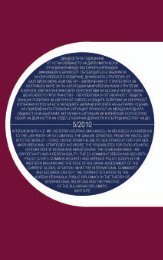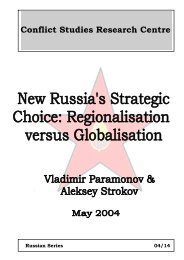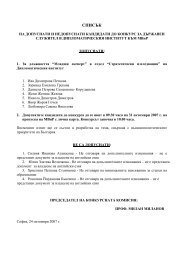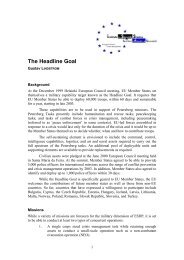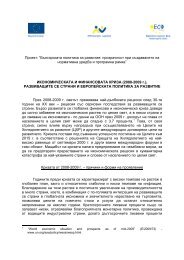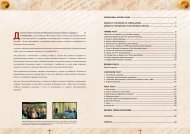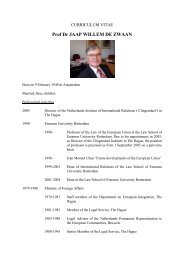The Myth of Ethnic Conflict: Chap 13 - Diplomatic Institute
The Myth of Ethnic Conflict: Chap 13 - Diplomatic Institute
The Myth of Ethnic Conflict: Chap 13 - Diplomatic Institute
Create successful ePaper yourself
Turn your PDF publications into a flip-book with our unique Google optimized e-Paper software.
476 Maria Todorova<br />
in the province <strong>of</strong> Eastern Rumelia, which was to be ruled by a<br />
Christian dignitary. About twenty Pomak villages refused to recognize<br />
this authority, forming the so-called “Pomak republic.” This<br />
lasted for about eight years until 1886, when, one year after the<br />
unification <strong>of</strong> the Bulgarian principality with Eastern Rumelia, the<br />
frontier with the Ottoman Empire was finally demarcated and these<br />
villages were included in the Ottoman Empire until the Balkan<br />
wars. 11<br />
<strong>The</strong> alienation <strong>of</strong> the Bulgarian-speaking Muslim population<br />
was compounded by the fact that the newly created Bulgarian nation-state<br />
did not attempt to integrate it but instead treated it as<br />
indistinguishable from the larger Muslim group. Thus in all censuses<br />
<strong>of</strong> the late nineteenth century (1880, 1885, 1888) the Bulgarian-speaking<br />
Muslims were entered under the heading “Turks.” It was only in<br />
the 1905 census that a separate group—“Pomaks”—appeared. 12 During<br />
the 1920s and especially during the 1930s a sustained campaign<br />
began in the press urging public opinion to discriminate between<br />
religious and ethnic allegiance and to accept the Pomaks as part <strong>of</strong><br />
the Bulgarian nation. This idea was most intensely espoused by the<br />
small educated elite among the Pomaks (principally teachers) who<br />
strove to elevate the economic and cultural level <strong>of</strong> their group and<br />
to rescue it from its ever-growing marginalization.<br />
In 1937 the organization Rodina (Motherland) was formed. Its<br />
principal aim was to foster a Bulgarian ethnic consciousness among<br />
the Bulgarian Muslims. Its activities covered mostly the Central and<br />
Western Rhodopes; it proved unsuccessful in the Eastern Rhodopes.<br />
In the course <strong>of</strong> seven years the organization introduced Bulgarianlanguage<br />
worship in the mosques, translated the Qur’an into Bulgarian,<br />
created a Bulgarian Muslim establishment separate from the<br />
Turkish, and promoted the creation <strong>of</strong> a local elite by enrolling Bulgarian<br />
Muslims into secondary and higher education establishments.<br />
It also attempted to reform everyday life by casting away<br />
the traditional costume, improving the lot <strong>of</strong> women, and ceasing<br />
the practice <strong>of</strong> circumcision. <strong>13</strong> Most important, in 1942 it embarked<br />
on a campaign to change the names <strong>of</strong> the Bulgarian Muslims to<br />
Bulgarian, although not Christian, names. It has been estimated that<br />
by September 1944, two-thirds <strong>of</strong> the Pomak population in the Central<br />
Rhodopes had changed their names. 14 Immediately after the war,<br />
Rodina was dissolved on the grounds <strong>of</strong> being a nationalistic Bul-



